This article may contain affiliate links. Please see our affiliate disclaimer in the footer menu for more information. Thank you for your support!
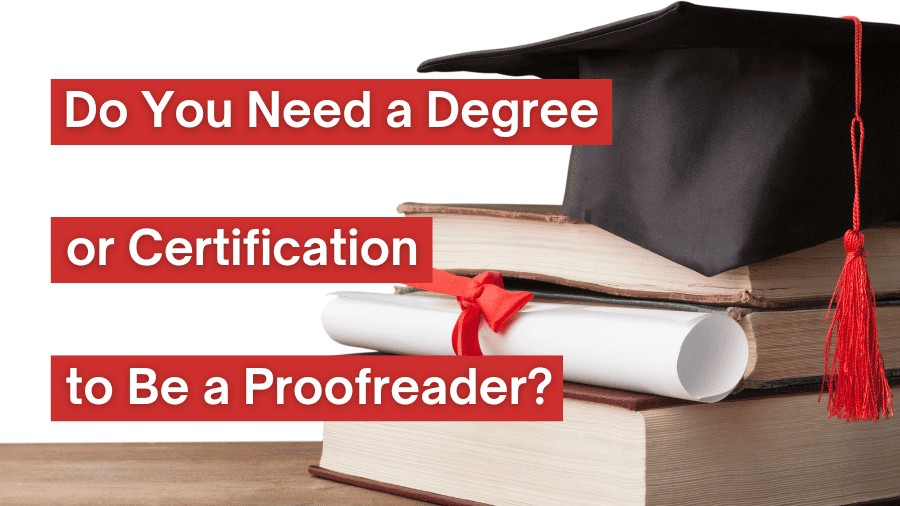
If you’re thinking about working as a proofreader, you’re probably wondering if you need a degree or certification. As a professional proofreader, I can help you figure out exactly what you need (and don’t need) to start working on error patrol. 😉
You do not need a degree or certification to be a proofreader. Although some proofreading jobs require a degree, most do not. However, you will need to receive adequate training to acquire the necessary skills.
Since a degree or certification isn’t necessary, let’s look at the qualities and skills needed to become a successful proofreader. We’ll also discover the best courses available to learn these skills. Finally, I’ll show you how to demonstrate your aptitude as a proofreader so you can land a job, even though you won’t have any experience yet.
Do You Need a Degree or Certification to Be a Proofreader?
Many people are surprised that neither a degree nor certification is necessary to be a proofreader.
A college degree is an advantage because college requires extensive reading and writing, which helps you hone the language skills needed for proofreading.
But plenty of avid readers and wonderful writers don’t have degrees. And these are the kinds of people who would make great proofreaders! Plus, only about 27% of people with degrees work in a field related to what they studied (source).
So don’t fret if you didn’t go to college. You can still become a proofreader.
Which Proofreading Jobs Require a Degree?
If you want to work for a publishing company, you’ll probably need a degree in English or journalism. However, a few publishing companies are moving away from this as they realize that one’s skill level as a proofreader is more important than having a degree.
“Many people believe you need to be an English major to pursue a publishing career, which isn’t true. There are many jobs within publishing, and we don’t require a college degree for most of our roles at Penguin Random House.”
– Penguin Random House
You may also need a degree to proofread medical, scientific, or technical documents.
Finally, a degree may be a prerequisite if you work for an online proofreading and editing company.
If you’d like to know what’s required for specific proofreading jobs, you can check out my article about beginner-friendly proofreading opportunities. After each job, I discuss the requirements.
Which Proofreading Jobs Do Not Require a Degree?
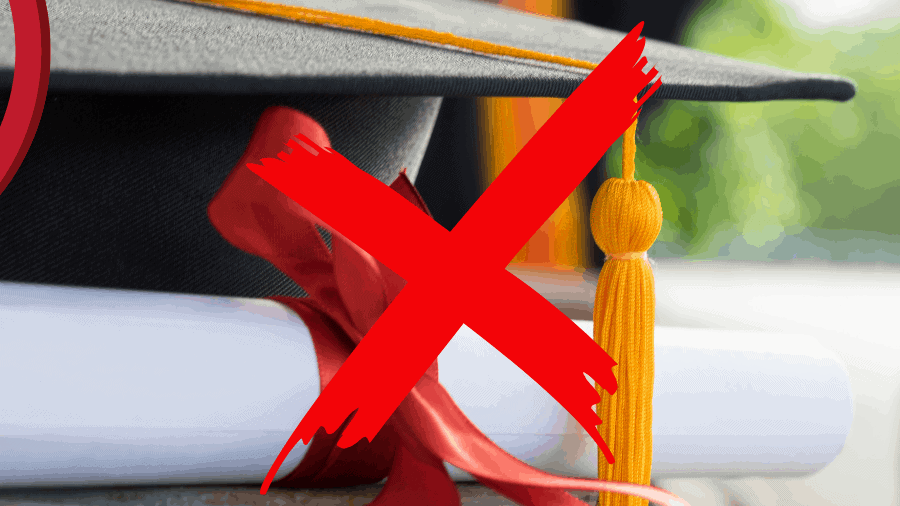
Many proofreading jobs don’t require a degree or certification of any kind. Here’s a list of some of the clients you can work for (no degree required) and the documents they may need proofread:
- Authors: books (fiction and nonfiction for children and adults), e-books
- Screenwriters: screenplays (for films, TV, commercials, etc.)
- Job seekers: résumés, cover letters, emails
- College students: college admissions essays, personal statements, papers, theses
- Bloggers: I’m thinking blog posts here. 😉
- Business owners: business documents, website copy, brochures, newsletters, product descriptions, user manuals
As you can see, all kinds of people can benefit from hiring a competent proofreader.
General Proofreading vs. Transcript Proofreading
One kind of client is absent from the list above: court reporters. Court reporters hire proofreaders to work on court transcripts—the official documents detailing what was said during legal proceedings.
Although you don’t need a degree or certification to be a transcript proofreader, you need specialized training. The training required for transcript proofreaders differs significantly from the training most proofreaders receive.
Most proofreaders opt to become general proofreaders so they can work on a wide variety of documents, including all the documents on the bulleted list above. When we talk about training in a bit, we’ll discuss becoming a general proofreader.
Adequate Training Is Required to Be a Proofreader
You’ll need proper training if you’re serious about proofreading and want to make decent money from it. You can receive adequate training by taking a comprehensive proofreading course. That way, you can compete with other proofreaders who have done the same.
Without training, you won’t have the confidence or the earning power of a proofreader who has completed a reputable proofreading course.
Soon, we’ll discuss a few excellent options for training. But first, let’s briefly address a common question of many aspiring proofreaders: Can you become a certified proofreader? The answer is yes, but it’s a bit complicated.
How Do You Become a Certified Proofreader?
Although you can’t acquire proofreading certification through any US-based organization, you can become a certified proofreader through Editors Canada. To obtain this professional certification, you must pass Editors Canada’s rigorous proofreading exam.
Editors Canada recommends that proofreaders who sit for the exam have at least five years of full-time proofreading experience since the exam tests for excellence, not proficiency. And how much does the exam cost? Gulp. It costs $550 for those who aren’t members of Editors Canada. Members pay $450.
You can certainly take the exam after you’ve accumulated enough experience; however, it’s unnecessary. I haven’t taken it, and to my knowledge, none of my proofreading colleagues have either.
What Qualifications Do You Need to Be a Proofreader?
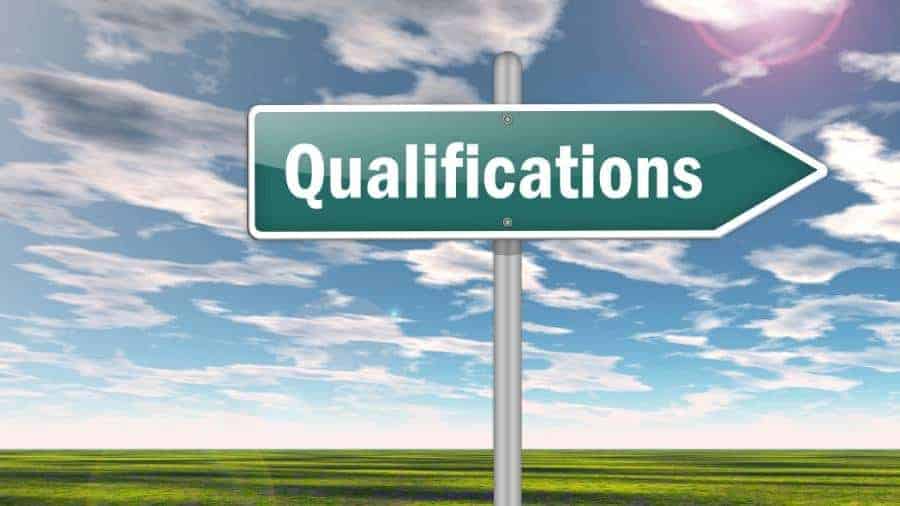
At dictionary.com, qualification is defined as “a quality, accomplishment, etc., that fits a person for some function, office, or the like.”
So let’s examine the qualities ideal for proofreaders and what you need to accomplish to become one.
What Are the Qualities Required to Be a Good Proofreader?
Here’s a list of the qualities you need to possess (or develop) to be a proofreader:
1) Strong Attention to Detail
Proofreading deals with the nitty-gritty, so being detail oriented is essential.
2) Capability to Concentrate for Long Periods
Although proofreaders take frequent breaks, you’ll need to maintain focus during those blocks of time you have your eyes on the screen.
3) Excellent Self-Discipline
If you become a freelance proofreader, it’ll be up to you to stay on top of your work.
4) A Love of Reading
I know it’s a big secret, but if you want to be a proofreader, you’ve gotta love to read!
5) Capacity to Work Alone
Proofreading is a job for one, so you have to be okay with working by yourself.
6) Desire to Stay Organized
Proofreaders often take on more than one job at a time, which means meeting different deadlines. Staying organized is a must!
7) Ability to Think Independently
Although you can reach out to your friendly fellow proofreaders when you need help, you’ll make all the decisions about how to best mark up a text.
8) Eagerness to Learn Continually
Since language and style guides constantly evolve, you’ll need to stay current with the latest trends and updates.
If you’d like to learn more about how the above qualities relate to proofreading, you can read my article discussing the skills needed to proofread.
Learning the relevant skills is what you’ll need to accomplish to become a proofreader. And how will you learn those skills? As we discussed earlier, you’ll learn them by taking a proofreading course, of course. 😊
So let’s see the skills you need for the job. Then, we’ll discover the best proofreading courses to teach you these skills.
If you have any doubts about the necessity of training, feel free to read my article about whether taking a proofreading course is a worthwhile investment.
What Skills Does a Proofreader Need?
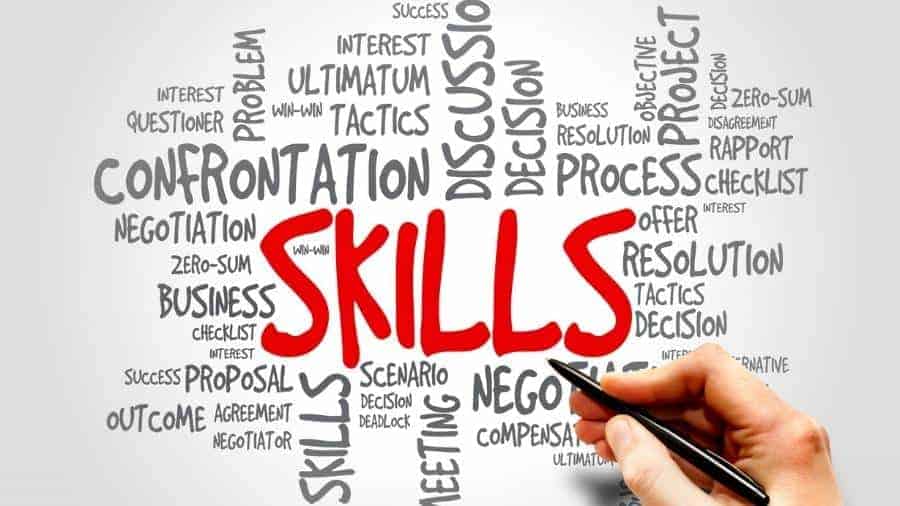
Proofreaders need a specific skill set to succeed.
What Does the Skill Set Look Like?
1) A Firm Grasp of Grammar, Punctuation, Capitalization, and Spelling
Since you’ll be correcting errors with grammar and mechanics, you’ll need expertise in this area.
2) Familiarity with One or More Major Style Guides (e.g., The Chicago Manual of Style)
Proofreaders use style guides to govern the decisions they make while proofreading. The style guide they use depends on the type of content they’re working on.
3) Broad General Knowledge
As a general proofreader, you’ll be proofing documents dealing with a wide variety of subject matter. Since it’s easier to proofread what you understand well, having a broad knowledge base is beneficial.
4) Computer Savvy
In today’s digital world, almost all proofreading is done on-screen, so computer skills are a necessity. Freelance proofreaders typically use Track Changes in MS Word or the Suggesting feature in Google Docs to mark up a document. Proofreaders working for publishing companies often work with Adobe PDF editor.
5) Solid Research Skills
Proofreaders don’t memorize every grammar and punctuation rule in all the major style guides. Instead, they rely on their refined research skills to find what they need in the applicable guide and dictionary.
6) Excellent Written Communication Skills (Especially Freelancers)
Proofreaders generally communicate with their clients via email or the messaging system on a freelance platform. Since people hire proofreaders to improve written communication, it can be off-putting to a client if the proofreader lacks solid writing skills.
7) Some Business and Marketing Knowledge (Just Freelancers)
As a freelance proofreader, you’ll need to know how to track income and expenses, send invoices, and maybe even prepare your taxes. However, most importantly, you’ll need to know how to market yourself.
How will anyone know to hire you to polish their writing if they don’t even know you exist? You’ll have to get the word out and advocate for yourself!
Now let’s discover the best programs on the market to learn these skills.
What Are the Best Courses to Learn Proofreading Skills?
Several comprehensive online proofreading classes are available to you.
Let’s look at four solid options for training, starting with a cost comparison.
Cost Comparison of Proofreading Courses
| Course | Cost | Exact Price |
|---|---|---|
| General Proofreading: Theory and Practice™ (Proofread Anywhere) |
$$ | $697 for Ignite version, $797 for Ignite Plus version* |
| Becoming a Proofreader (Knowadays) |
$ | $499 |
| Essential Proofreading: Editorial Skills One (PTC) |
$ | £330 (roughly $410) + VAT |
| It’s a series of three classes: Proofreading 1: Introduction Proofreading 2: Headway Proofreading 3: Progress (CIEP) |
$$$$ | £870 for nonmembers (roughly $1,085) + VAT; discounts available for CIEP members |
Here are the key takeaways from each course so you can understand what they offer.
Proofread Anywhere
The General Proofreading: Theory and Practice™ course is the one I took, and I highly recommend it. This course teaches you how to find the answers you need in one of the most commonly used style guides: The Chicago Manual of Style.
It also teaches you how to build a proofreading business and market yourself.
Knowadays
The Becoming a Proofreader course teaches you everything you need to know to start proofreading.
This course is known for its supportive staff and for teaching students how to improve a text’s readability and tone.
The Publishing Training Centre
The Essential Proofreading: Editorial Skills One course is offered by a very well-established editorial organization. It does not provide any training in grammar, punctuation, etc., but it does include a training manual to help you create a business and market yourself.
You’re also assigned a personal tutor for the duration of the course.
The Chartered Institute of Editing and Proofreading
This series of proofreading courses is offered by a prestigious organization in the editing industry. It doesn’t include training in grammar, punctuation, etc.
However, it’s the most comprehensive program for learning about all aspects of proofreading, provided you work through all three classes in the series.
I’ve written a comprehensive article comparing these proofreading courses if you’d like to learn more. This post goes into detail about how each program awards proofreading certificates.
Can I Get By with Taking an Inexpensive Course?
You may wonder if taking a relatively cheap class (maybe in the $100 range) is a viable option. My best advice is that if you want to make decent money from proofreading, I wouldn’t recommend it.
Although it may be tempting to spend less money, the training in these inexpensive courses isn’t likely to sufficiently prepare you for proofreading work.
After all, proofreading is a career for some, and many people attend college to prepare for a career. Luckily, we know that having a four-year degree isn’t necessary to be a proofreader.
However, your clients will expect you to have the necessary expertise.
I would only recommend a low-cost course if you’re still unsure that proofreading is a good fit for you. That way, you can get a taste of what the job is like.
If you need some suitable classes to choose from, you can find them in my article “7 Best Free Proofreading Courses (+ Low-Cost Options).”
How to Become a Proofreader with No Experience
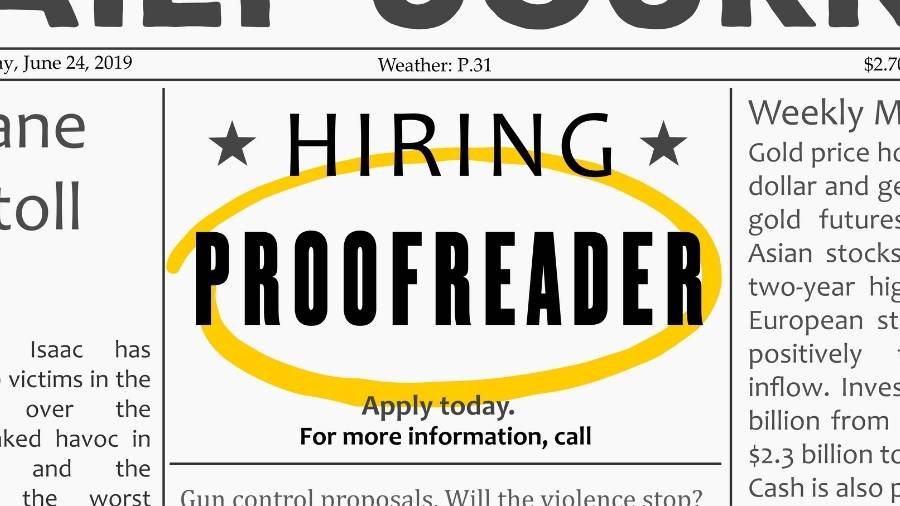
Many aspiring proofreaders wonder how they can become proofreaders without experience. To answer this question, I’ve written a comprehensive article about the process of becoming a proofreader.
If you’ve decided proofreading is for you, I think reading this post will give you good food for thought. One of the eight steps is to take a proofreading course.
But after the course, you may be concerned that you’ll find yourself in a familiar catch-22.
You know the one I’m talking about—you need the experience to get the job, but you need the job to get the experience.
It’s a bummer to be in this predicament. Luckily, trained proofreaders have plenty of ways to prove their proficiency, even if they lack experience.
How to Prove Your Proofreading Proficiency (Sans Experience)
Here are four methods for showing potential clients you can provide value, even if you don’t have any real-world proofreading experience.
1) Display your certificate from a proofreading course.
You can post the certificate on your profile on freelancing platforms and on your business website. Displaying your certificate will show clients that you’ve received formal training—always a plus!
I wrote an article called “How to Get a Proofreading Certificate (+ 5 Helpful Tips)” if you’d like to know more. In this article, I show you what my digital proofreading certificate looks like and share tips for maximizing your earnings as a proofreader.
2) Accumulate positive reviews on freelancing sites.
Working on freelance sites like Fiverr, Upwork, and Freelancer can be a great way for beginners to get additional proofreading practice and earn testimonials. The hardest part of working on these sites is getting your first handful of clients.
I chose to proofread on Fiverr after I finished training. I wrote an in-depth article on how to be successful on Fiverr if you’d like actionable tips for getting that first batch of clients. Many of the tips in this article apply to all freelance platforms, not just Fiverr.
3) Provide a sample edit.
A sample edit is when you proofread a small portion of a potential client’s document. Sample edits usually range from 250 to 1,000 words, depending on the length of the text. Some proofreaders do this for free, and others charge a fee. By providing a sample edit, your potential client can see how much you can help them.
4) Pass a proofreading test.
If you want to work for an online proofreading and editing company, the first requirement will probably be to take a proofreading test. Passing this test is a way to demonstrate that you have what it takes.
I hope these four tips have clarified how to show others that your proofreading skills are up to par. And now you know that neither a degree nor certification is needed to be on error patrol! 😊
I wish you the best if proofreading is a path you choose to pursue!
If you’re curious about how much proofreaders earn, this article on Om Proofreading talks about how much freelance and employed proofreaders make.
Best wishes to you!
“Wanting to be someone else is a waste of the person you are.”
– Marilyn Monroe
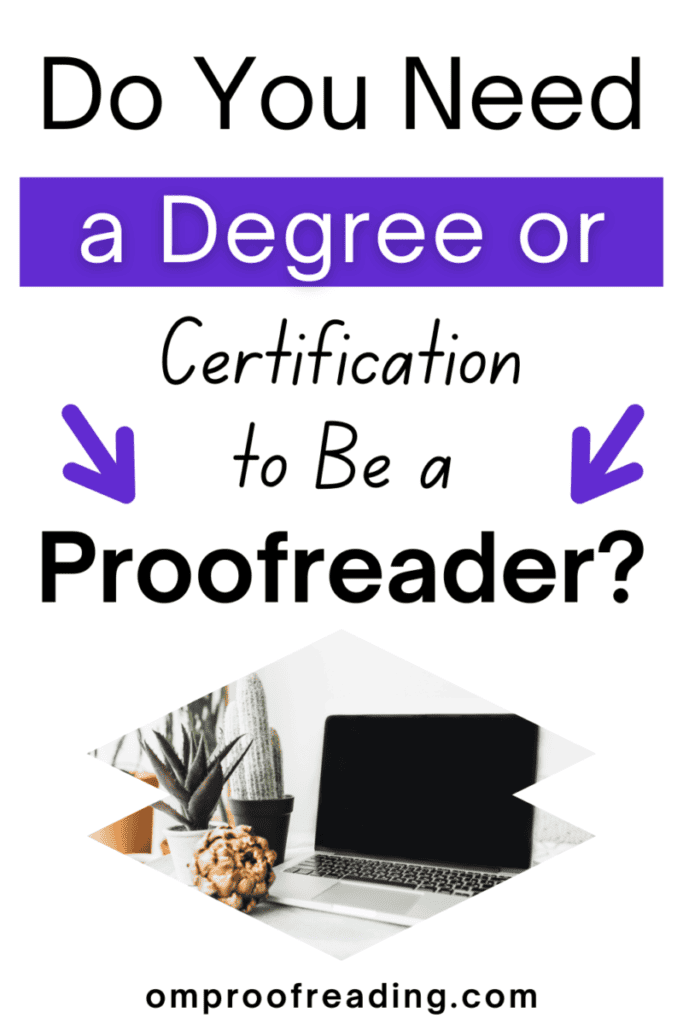
Recent Posts
Punctuation is important because it enables us to communicate our message clearly and effectively. Without punctuation, we wouldn’t understand how units of a sentence relate to one another or how...
Although you're probably somewhat familiar with adverbs, you may be unaware of sentence adverbs. As a trained proofreader who has studied the parts of speech, I can help you understand this unique...
